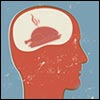The "right to die" controversy was recently injected with new life, with the emergence of the story of Rom Houben, a 46-year-old Belgian who was considered to be in a vegetative state for 23 years, and who doctors now believe was conscious the entire time.
Houben was injured in a car crash in 1983 when he was 20. His doctors used the Glasgow coma scale – which assesses eye, verbal and motor responses – and concluded that he could hear nothing and feel nothing.
Then, in 2006, a team of doctors discovered that he had an "almost normal" level of brain activity, capable of hearing what was being said around him, but unable to respond. Houben was suffering from a form of "locked-in syndrome," in which people are unable to speak or move but can think and reason.
Since their discovery, they have provided him with the equipment to communicate. Helped by a therapist, Houben's finger tapped on a computer touchscreen: "I was shouting, but no one could hear me." Houben further communicated that he was "alone, lonely, frustrated" in the two-plus decades that he was trapped inside a paralyzed body.
The scary thing is that the lead doctor on the team claims that "up to 43 percent of patients with disorders of consciousness are erroneously assigned a diagnosis of vegetative state."
The knee-jerk reaction to this story is: can you imagine if his family had opted to remove this "valueless" life from life support?
Interestingly, however, euthanasia proponents suggest that this discovery makes a compelling argument for their stance. In an article for the Huffington Post, bioethicist and medical historian Jacob M. Appel writes:
"...Houben's own words are haunting: 'I would scream, but no sound would come out....I became the witness to my own suffering, as doctors and nurses tried to speak to me and eventually gave up.' That sounds strikingly like a form of torture. Keep in mind that patients like this have no guarantee that their consciousness will ever be discovered.... So rather than offering a compelling reason to keep such patients alive, the horrors of enduring such a petrified existence may offer a compelling reason to let them die."
He even suggests that perhaps "some forms of suffering are so horrific that a few patients may have to die against their preferences so that others will not have to undergo years of unremitting psychological agony."
Much has been written about the Jewish view on euthanasia and the value it ascribes to life. I refer you to the following lines written by Yanki Tauber, senior editor of Chabad.org, in response to the Terri Schiavo controversy, which I feel express the view best, and even foretell the suggestion that some should die against their preferences to spare others the pain of a life that a panel of bioethicists have taken the liberty to deem worthless:
"When a society loses sight of the divine, absolute value of life, the change is at first all but imperceptible. At first it is only the weakest, most defenseless lives that are affected. Lives that have no voice—society doesn't hear them, or even goes so far as to put words into their mouths for them. But that first step is, in many ways, the most crucial one. Unless the trend is halted and reversed, it will lead to a second step and a third, and before long, we will be deep in the barbaric woods where everything is relative, where the right to life is entirely relative to power, wealth and physical strength.
"For unless life has absolute value, it ultimately has no value....and before long, we're deep in the jungle."
(For the full article, see The Value of Life.)
This episode also provides insight in another, more spiritual area.
The human being is comprised of body and soul. The soul, "a veritable part of G‑d," is aware that human existence has a purpose, as defined in the Torah. It is the soul's ambition and task to make the human mind conscious of its holy mission.
I am afraid to consider that sometimes a person can go two decades – or three, four, five, six or more... – throughout which the soul is "shouting, but no one could hear." The soul is "witness to its own suffering," as the signals it broadcasts are ignored. Surely the soul is "lonely and frustrated" all those years it is trapped inside a body that is completely unresponsive to its nervous system.
The difference is that unlike Houben, about whom "doctors and nurses tried to speak to and eventually gave up," the One who puts us through this ordeal doesn't give up. He continues to provide all the help necessary to achieve a complete recovery.
It is up to us to hearken to the soul's sometimes silent cry. And when we finally listen in, all the years of suffering become a catalyst for a future life of unparalleled quality, justifying the decades of its pain.






